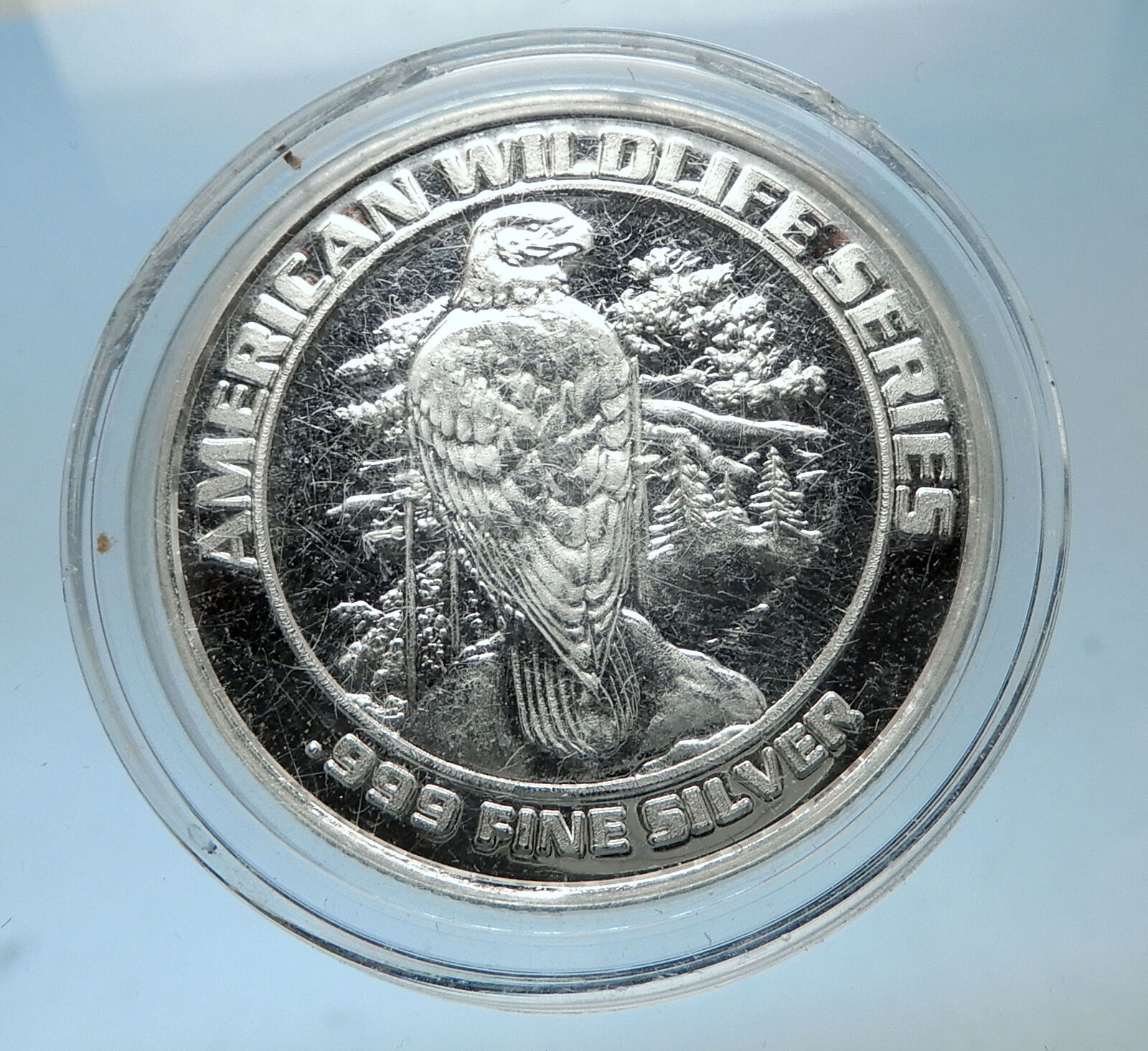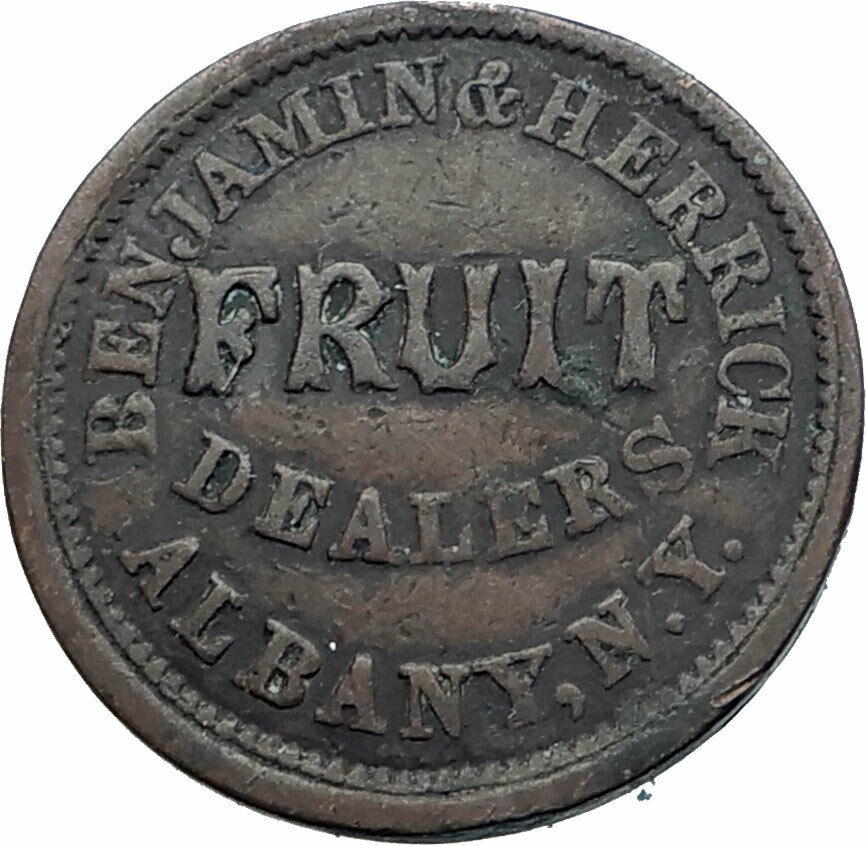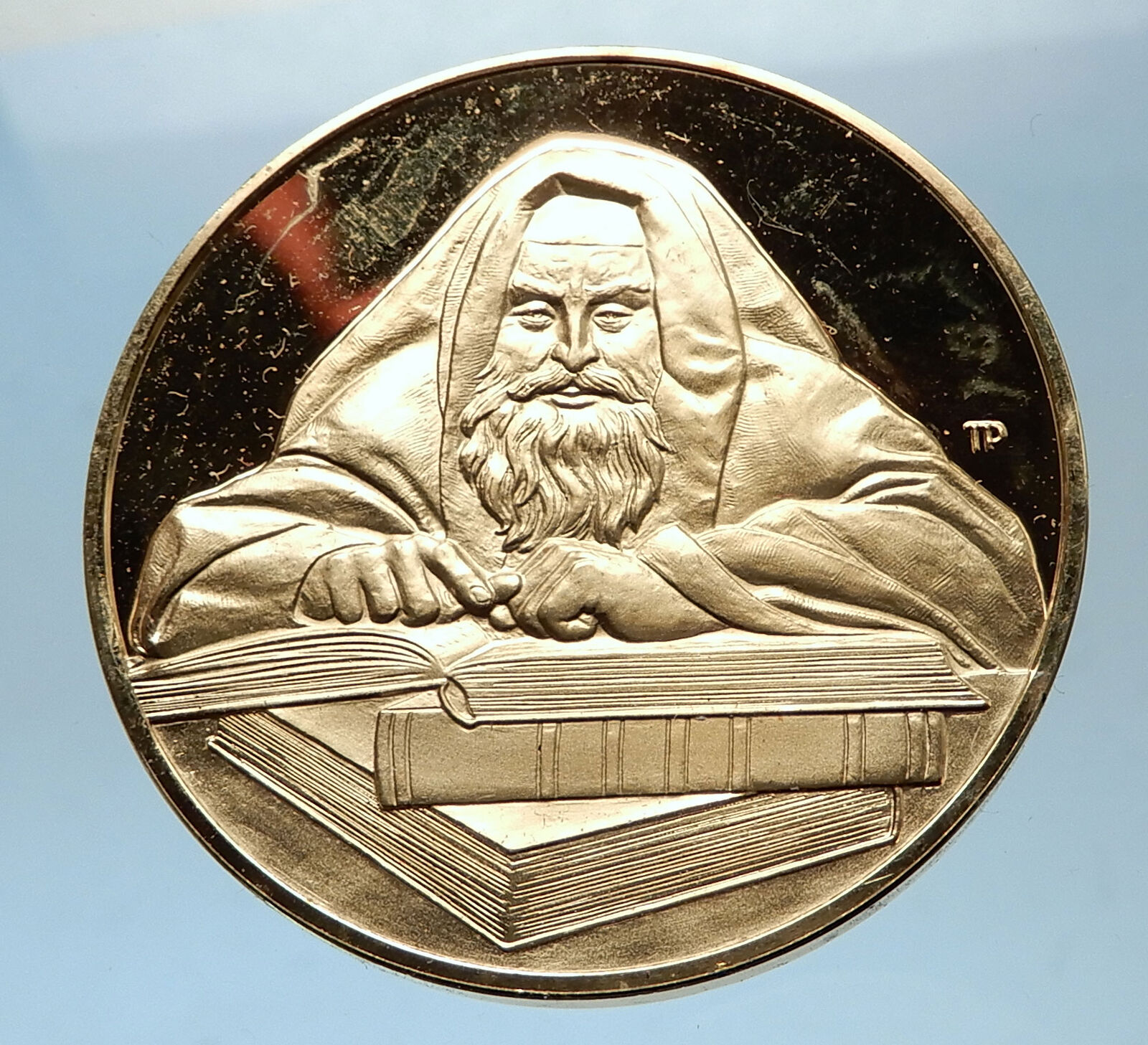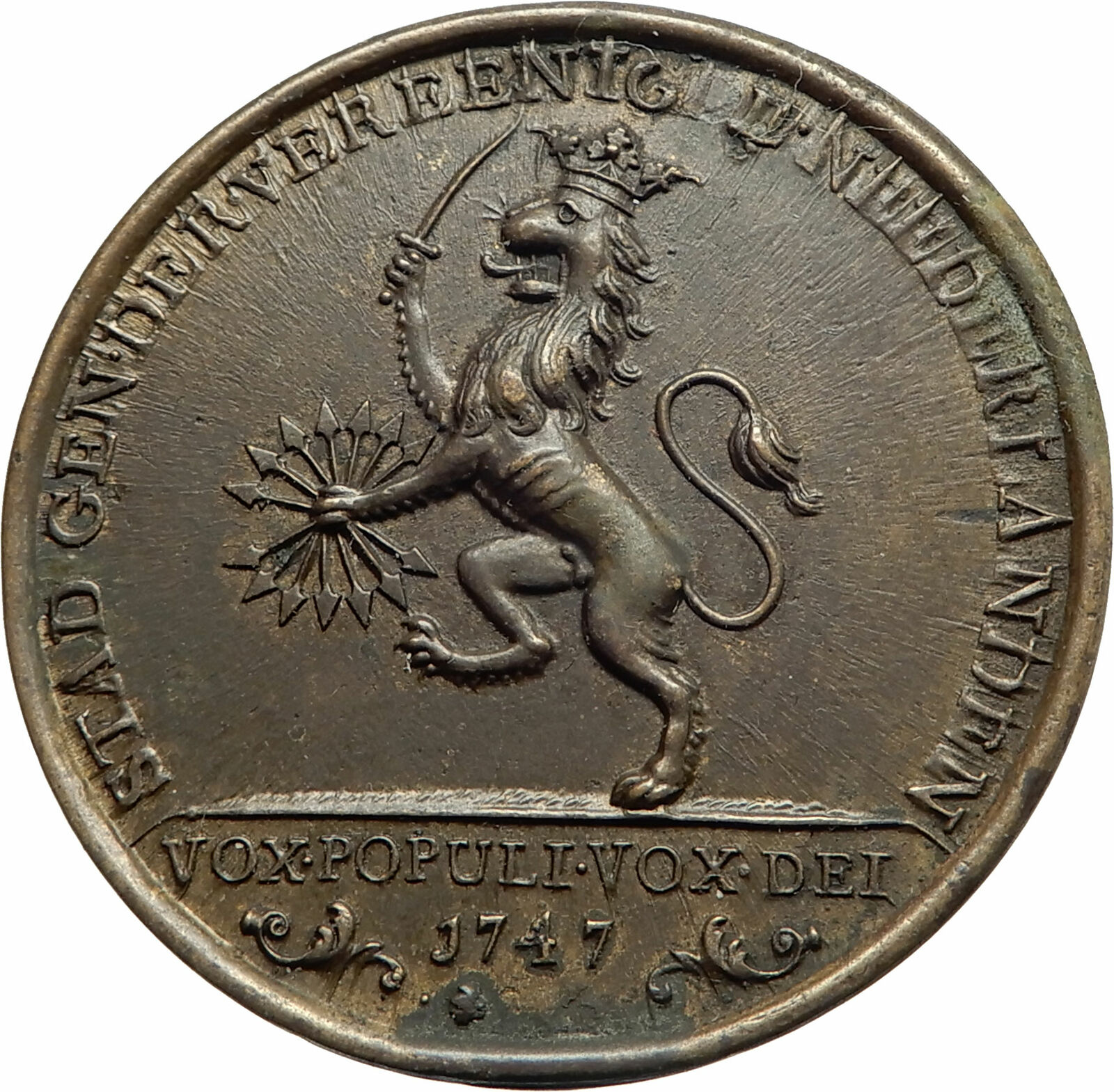|
Italy. Vatican
Pope Francis | Saint Peter’s Square
Pius IX -Pope: 16 June 1846 – 7 February 1878
2013 Silver Medal 38mm (31.10 grams) 0.999 Silver (1.00 oz. ASW)
Mintage: 25,000
HIS HOLINESS, POPE FRANCIS, Francis facing 1/4 left.
The Vatican March 13, 2013, View of St. Peter’s Square.
Edge Lettering:
.999
You are bidding on the exact item pictured, provided with a Certificate of Authenticity and Lifetime Guarantee of Authenticity.
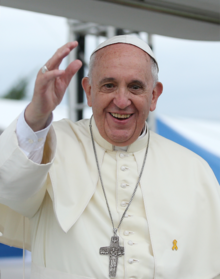 Pope Francis (Latin: Franciscus; Italian: Francesco; Spanish: Francisco; born Jorge Mario Bergoglio, 17 December 1936) is the head of the Catholic Church and sovereign of the Vatican City State. Francis is the first Jesuit pope, the first from the Americas, the first from the Southern Hemisphere, and the first pope from outside Europe since the Syrian Gregory III, who reigned in the 8th century. Pope Francis (Latin: Franciscus; Italian: Francesco; Spanish: Francisco; born Jorge Mario Bergoglio, 17 December 1936) is the head of the Catholic Church and sovereign of the Vatican City State. Francis is the first Jesuit pope, the first from the Americas, the first from the Southern Hemisphere, and the first pope from outside Europe since the Syrian Gregory III, who reigned in the 8th century.
Born in Buenos Aires, Argentina, Bergoglio was ordained a Catholic priest in 1969, and from 1973 to 1979 was Argentina’s provincial superior of the Society of Jesus (Jesuits). He became the archbishop of Buenos Aires in 1998 and was created a cardinal in 2001 by Pope John Paul II. He led the Argentine Church during the December 2001 riots in Argentina. The administrations of Néstor Kirchner and Cristina Fernández de Kirchner considered him a political rival. Following the resignation of Pope Benedict XVI on 28 February 2013, a papal conclave elected Bergoglio as his successor on 13 March. He chose Francis as his papal name in honor of Saint Francis of Assisi.
Throughout his public life, Pope Francis has been noted for his humility, emphasis on God’s mercy, international visibility as pope, concern for the poor and commitment to interfaith dialogue. He is credited with having a less formal approach to the papacy than his predecessors, for instance choosing to reside in the Domus Sanctae Marthae guesthouse rather than in the papal apartments of the Apostolic Palace used by previous popes. He maintains that the Church should be more open and welcoming. He does not support unbridled capitalism or Marxism. Francis maintains the traditional views of the Church regarding abortion, marriage, ordination of women, and clerical celibacy. He opposes consumerism and overdevelopment, and supports taking action on climate change, a focus of his papacy with the promulgation of Laudato si’. In international diplomacy, he helped to temporarily restore full diplomatic relations between the United States and Cuba and supported the cause of refugees during the European and Central American migrant crises. Since 2018, he has been a vocal opponent of neo-nationalism. Francis has faced open criticism from theological conservatives on many questions, including the admission of civilly divorced and remarried Catholics to Communion with the publication of Amoris laetitia. He responded to the Church’s alleged cover-up of sexual abuse by clergy with his motu proprio Vos estis lux mundi.
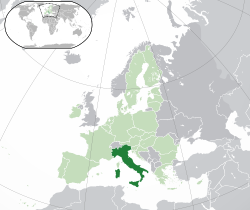  Italy, officially the Italian Republic (Italian: Repubblica Italiana), is a unitary parliamentary republic in Europe. Italy covers an area of 301,338 km2 (116,347 sq mi) and has a largely temperate climate; due to its shape, it is often referred to in Italy as lo Stivale (the Boot). With 61 million inhabitants, it is the 4th most populous EU member state. Located in the heart of the Mediterranean Sea, Italy shares open land borders with France, Switzerland, Austria, Slovenia, San Marino and Vatican City. Italy, officially the Italian Republic (Italian: Repubblica Italiana), is a unitary parliamentary republic in Europe. Italy covers an area of 301,338 km2 (116,347 sq mi) and has a largely temperate climate; due to its shape, it is often referred to in Italy as lo Stivale (the Boot). With 61 million inhabitants, it is the 4th most populous EU member state. Located in the heart of the Mediterranean Sea, Italy shares open land borders with France, Switzerland, Austria, Slovenia, San Marino and Vatican City.
 Since ancient times, Greek, Etruscan, Celtic, and other cultures have thrived on the Italian Peninsula. Rome ultimately emerged as the dominant power, conquering much of the ancient world and becoming the leading cultural, political, and religious centre of Western civilisation. During the Dark Ages, the region suffered sociopolitical collapse amid calamitous barbarian invasions, but by the 11th century, numerous Italian city-states rose to great prosperity through shipping, commerce and banking, and even laid the groundwork for capitalism. The Renaissance led to a flourishing of Italian culture, producing famous scholars, artists, and polymaths such as Leonardo da Vinci, Galileo, Michelangelo and Machiavelli. Italian explorers such as Marco Polo, Christopher Columbus, Amerigo Vespucci, and Giovanni da Verrazzano discovered new routes to the Far East and the New World, helping to usher in the European Age of Discovery. Nevertheless, Italy remained politically fragmented and fell prey to European powers such as France, Spain, and later Austria, subsequently entering a long period of decline that lasted until the mid-19th century. Since ancient times, Greek, Etruscan, Celtic, and other cultures have thrived on the Italian Peninsula. Rome ultimately emerged as the dominant power, conquering much of the ancient world and becoming the leading cultural, political, and religious centre of Western civilisation. During the Dark Ages, the region suffered sociopolitical collapse amid calamitous barbarian invasions, but by the 11th century, numerous Italian city-states rose to great prosperity through shipping, commerce and banking, and even laid the groundwork for capitalism. The Renaissance led to a flourishing of Italian culture, producing famous scholars, artists, and polymaths such as Leonardo da Vinci, Galileo, Michelangelo and Machiavelli. Italian explorers such as Marco Polo, Christopher Columbus, Amerigo Vespucci, and Giovanni da Verrazzano discovered new routes to the Far East and the New World, helping to usher in the European Age of Discovery. Nevertheless, Italy remained politically fragmented and fell prey to European powers such as France, Spain, and later Austria, subsequently entering a long period of decline that lasted until the mid-19th century.
After various unsuccessful attempts, the second and the third wars for Italian independence resulted in the eventual unification of most of present-day Italy by 1866. From the late 19th century to the early 20th century, the new Kingdom of Italy rapidly industrialised and acquired a colonial empire, becoming a great power. However, southern and rural areas of the country remained largely excluded from industrialisation, fuelling a large and influential diaspora. Despite being one of the main victors in World War I, Italy entered a period of economic crisis and social turmoil, leading the way to the rise of a Fascist dictatorship in 1922. The subsequent participation in World War II on the Axis side ended in military defeat, economic destruction and civil war. In the years that followed, Italy abolished the monarchy, reinstated democracy, and enjoyed a prolonged economic boom, thus becoming one of the world’s most developed nations.
Italy has the third largest economy in the Eurozone and the eighth largest economy in the world. It has a very high level of human development and enjoys the highest life expectancy in the EU. Italy plays a prominent role in global military, cultural and diplomatic affairs and is also considered to be a major regional power in Europe. Italy is a founding and leading member of the European Union and the member of numerous international institutions, including the UN, NATO, the OECD, the OSCE, the WTO, the G7/G8, G20, the Union for the Mediterranean, the Council of Europe, Uniting for Consensus, and many more. As a reflection of its vast cultural wealth, Italy is home to 51 World Heritage Sites, the most in the world, and is one of the most visited countries.
|





 Pope Francis (Latin: Franciscus; Italian: Francesco; Spanish: Francisco; born Jorge Mario Bergoglio, 17 December 1936) is the head of the Catholic Church and sovereign of the Vatican City State. Francis is the first Jesuit pope, the first from the Americas, the first from the Southern Hemisphere, and the first pope from outside Europe since the Syrian Gregory III, who reigned in the 8th century.
Pope Francis (Latin: Franciscus; Italian: Francesco; Spanish: Francisco; born Jorge Mario Bergoglio, 17 December 1936) is the head of the Catholic Church and sovereign of the Vatican City State. Francis is the first Jesuit pope, the first from the Americas, the first from the Southern Hemisphere, and the first pope from outside Europe since the Syrian Gregory III, who reigned in the 8th century. 
 Italy, officially the Italian Republic (Italian: Repubblica Italiana), is a unitary parliamentary republic in Europe. Italy covers an area of 301,338 km2 (116,347 sq mi) and has a largely temperate climate; due to its shape, it is often referred to in Italy as lo Stivale (the Boot). With 61 million inhabitants, it is the 4th most populous EU member state. Located in the heart of the Mediterranean Sea, Italy shares open land borders with France, Switzerland, Austria, Slovenia, San Marino and Vatican City.
Italy, officially the Italian Republic (Italian: Repubblica Italiana), is a unitary parliamentary republic in Europe. Italy covers an area of 301,338 km2 (116,347 sq mi) and has a largely temperate climate; due to its shape, it is often referred to in Italy as lo Stivale (the Boot). With 61 million inhabitants, it is the 4th most populous EU member state. Located in the heart of the Mediterranean Sea, Italy shares open land borders with France, Switzerland, Austria, Slovenia, San Marino and Vatican City. Since ancient times, Greek, Etruscan, Celtic, and other cultures have thrived on the Italian Peninsula. Rome ultimately emerged as the dominant power, conquering much of the ancient world and becoming the leading cultural, political, and religious centre of Western civilisation. During the Dark Ages, the region suffered sociopolitical collapse amid calamitous barbarian invasions, but by the 11th century, numerous Italian city-states rose to great prosperity through shipping, commerce and banking, and even laid the groundwork for capitalism. The Renaissance led to a flourishing of Italian culture, producing famous scholars, artists, and polymaths such as Leonardo da Vinci, Galileo, Michelangelo and Machiavelli. Italian explorers such as Marco Polo, Christopher Columbus, Amerigo Vespucci, and Giovanni da Verrazzano discovered new routes to the Far East and the New World, helping to usher in the European Age of Discovery. Nevertheless, Italy remained politically fragmented and fell prey to European powers such as France, Spain, and later Austria, subsequently entering a long period of decline that lasted until the mid-19th century.
Since ancient times, Greek, Etruscan, Celtic, and other cultures have thrived on the Italian Peninsula. Rome ultimately emerged as the dominant power, conquering much of the ancient world and becoming the leading cultural, political, and religious centre of Western civilisation. During the Dark Ages, the region suffered sociopolitical collapse amid calamitous barbarian invasions, but by the 11th century, numerous Italian city-states rose to great prosperity through shipping, commerce and banking, and even laid the groundwork for capitalism. The Renaissance led to a flourishing of Italian culture, producing famous scholars, artists, and polymaths such as Leonardo da Vinci, Galileo, Michelangelo and Machiavelli. Italian explorers such as Marco Polo, Christopher Columbus, Amerigo Vespucci, and Giovanni da Verrazzano discovered new routes to the Far East and the New World, helping to usher in the European Age of Discovery. Nevertheless, Italy remained politically fragmented and fell prey to European powers such as France, Spain, and later Austria, subsequently entering a long period of decline that lasted until the mid-19th century.

